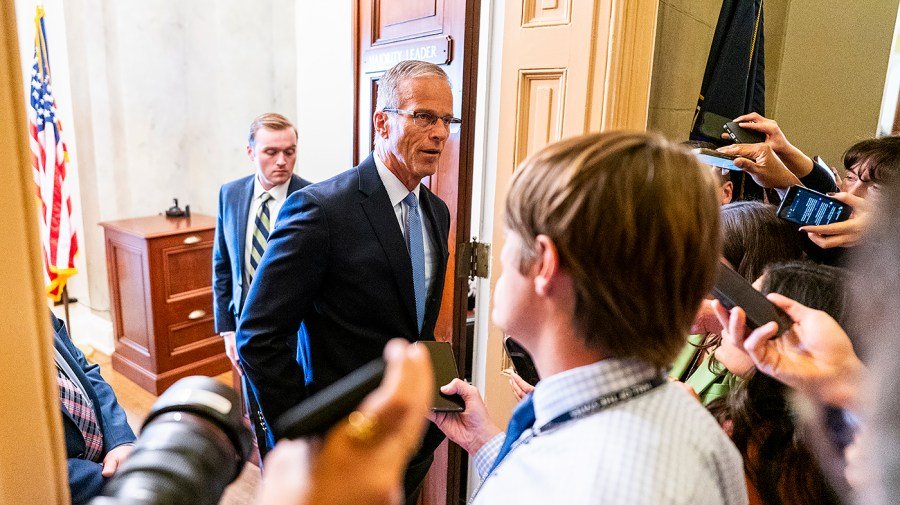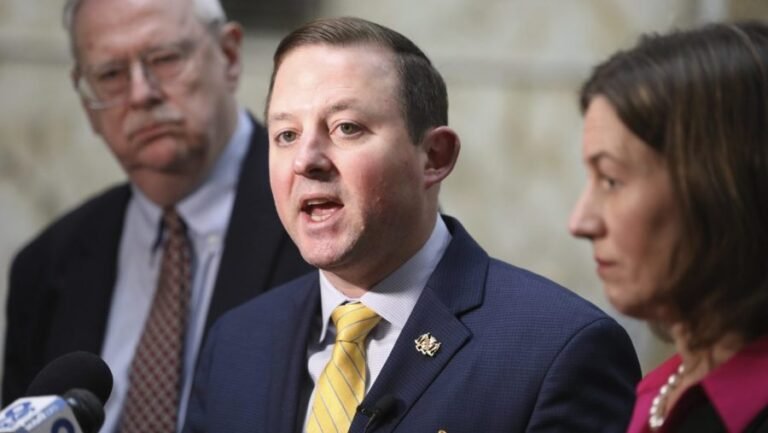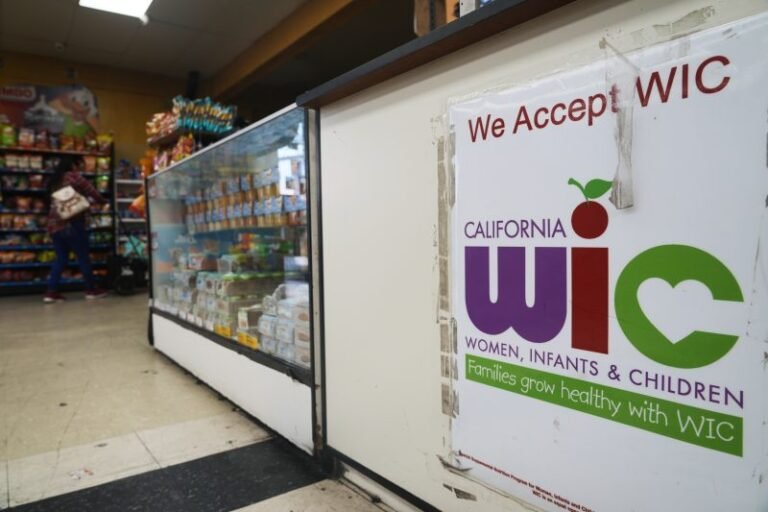
Senate Democrats are taking a close look at a Republican proposal to pay all federal employees — including essential and furloughed workers — as they’re under new pressure from the nation’s largest federal workers union to pass a clean continuing resolution to reopen the government.
They also plan to introduce legislation to pay for Supplemental Nutrition Assistance Program (SNAP) benefits and extend funding for the Special Supplemental Nutrition Program for Women, Infants, and Children (WIC), which provides essential nutrition assistance for lower-income mothers.
The developments reveal that Democrats are looking for a way to ease the impact of the four-week shutdown on federal workers who are struggling to pay their daily expenses and on lower-income Americans who may soon run out of food.
Publicly, Senate Democratic Leader Chuck Schumer (N.Y.) and his leadership team are sticking to their arguments that President Trump needs to start negotiating on health insurance subsidies before they agree to reopen the government.
At the same time, Democrats are feeling intense pressure to end the shutdown in a way that gives them a political win — or at least a face-saving off-ramp from the stalemate that has stalled Washington for nearly 30 days.
Democratic leaders say they want Trump to negotiate with them over rising health insurance premiums, but they haven’t yet said what exactly it would take to get enough votes to reopen government.
Democratic senators say they are hearing from experts who warn that more than 40 million Americans risk going hungry if SNAP benefits are allowed to run out — an approaching crisis they say is being made worse by the Trump administration’s refusal to spend emergency food assistance funds during the shutdown.
“In the conference, nobody wants to be shut down. We’re trying to figure out what we want from them,” said a Democratic senator who requested anonymity to discuss uneasiness within the Democratic caucus over how long the shutdown has dragged on.
The senator said colleagues are hearing from not only from the American Federation of Government Employees (AFGE), which represents 820,000 federal workers and called on Democrats this week to pass a clean continuing resolution to reopen government, but also from experts concerned about food assistance running out.
“We’ve heard from unions. We hear more from the nutrition people, they’re worried about running out of nutrition. That’s because the president doesn’t care about screwing people. He wants to screw us. That’s why this is such a slog,” the Democratic lawmaker said.
Several Democratic senators said Tuesday they would take a close look at a proposal sponsored by Sen. Ron Johnson (R-Wis.) to pay all federal workers — essential workers who have been required to report for duty during the shutdown and furloughed workers who have been told to stay home for weeks.
“It’s something we’ll take a close look at. I think if we could get it right, it’s something that would get a lot of support,” centrist Sen. Mark Kelly (D-Ariz.) said.
Sen. Tim Kaine (D-Va.), who represents more than 100,000 federal employees, said he would also examine the Republican proposal.
“I’ll take a look. And the key will be, ‘Are the Rs going to put it up for a vote?’” he said.
Sen. Bernie Sanders (Vt.), an independent who caucuses with Democrats, said he would also review the bill to pay federal workers even if federal departments and agencies stay closed.
“I would need to go look at the details of that,” he said.
Three Democrats voted last week for Johnson’s proposal to pay only essential federal workers, such as active-duty members of the military, air traffic controllers and Transportation Security Administration agents.
Sens. John Fetterman (D-Pa.), Raphael Warnock (D-Ga.) and Jon Ossoff (D-Ga.), who faces a competitive reelection race next year, voted for the measure.
Senate Majority Leader John Thune (R-S.D.) said he may bring Johnson’s amended bill to also pay furloughed federal employees up for a vote right before the election in Virginia next Tuesday.
The state, which will elect a new governor and attorney general, is home to approximately 140,000 federal employees.
Thune told reporters Tuesday morning that it’s “very, very possible” the proposal to pay all federal employees during the shutdown will come to the floor in the next few days.
Thune said Johnson “has been talking to Dems about adding furloughed workers” and predicted there would be “strong” Republican support for the bill.
The lead Democratic negotiator on proposals to pay federal workers during the shutdown, Sen. Chris Van Hollen (D-Md.), hasn’t yet signed off on Johnson’s offer because he wants to add language that would prevent Trump from attempting mass layoffs or reductions in force (RIFs).
Vice President Vance urged Senate Republicans at a lunch meeting Tuesday to keep the pressure on Senate Democrats by not allowing votes on legislation to pay SNAP benefits or air traffic controllers during the shutdown, according to Republican senators who attended the meeting.
Vance urged GOP senators to stick with Thune’s strategy of holding repeated votes on a House-passed continuing resolution to fund the government through Nov. 21.
His argument, according to GOP sources familiar with the discussion, is that passing so-called rifle-shot measures to reopen the parts of the government would take the pressure off Democrats and possibly extend the shutdown.
Passing such bills in the Senate would also put pressure on the Speaker Mike Johnson (R-La.) to reconvene the House to take up the legislation, further undermining the broader strategy of isolating Senate Democrats during the shutdown.
“Right now, Democrats are under a lot of pressure. You got the unions coming on against them, you got SNAP running out next week,” said a Republican senator who requested anonymity to talk about internal party strategy.
“I am very hopeful that we are close either this week or next week to pass the CR,” the source said, referring to the House-passed stopgap funding measure.
The senator said Thune and the Speaker are taking a stance against moving bills that open only parts of the government.
“If you start changing direction now, you complicate it and bring the House back,” the senator added.
Speaker Johnson told reporters Tuesday that votes to fund special carve-outs, such as salaries for federal workers or SNAP benefits, are a “waste of our time.”
“We voted Sept. 19 to fund every one of those priorities, and every Democrat in the House except one voted to not fund them,” Mike Johnson said at a press conference Tuesday.
“The Democrats are playing games. They put a few of the one-off bills on the floor, as you’ve seen in the last week or so. They put a bill to pay the troops, pay essential workers, and Democrats voted it down,” he said.
Emily Brooks contributed.


